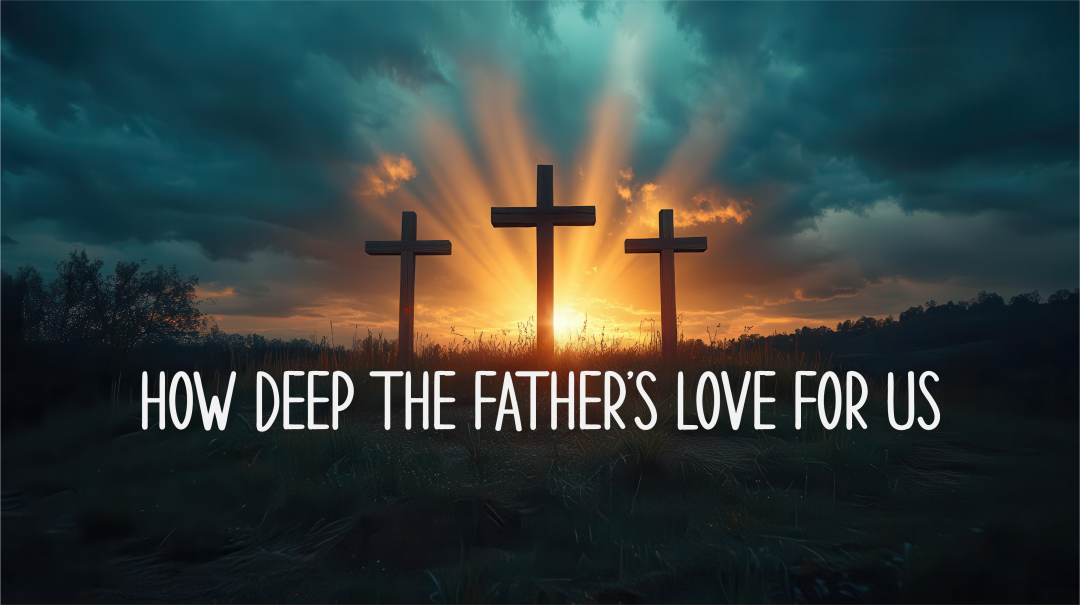
One worship song that deeply moves me is How Deep the Father's Love for Us by Stuart Townend. This song beautifully encapsulates the essence of God's incredible love and the sacrifice of Jesus Christ, drawing heavily from biblical truths. In each verse, Townend weaves a narrative that mirrors the story of the Gospel, making it a powerful reflection for believers. As we dig into the lyrics, let’s explore the biblical references illuminating God’s love for us.
A Love Beyond Measure: The First Stanza
The song opens with a profound declaration of God's love:
“How deep the Father's love for us,
How vast beyond all measure” (John 3:16)
These lines call to mind one of the most quoted and cherished verses in the Bible—John 3:16:
For God so loved the world, that he gave his only Son, that whoever believes in him should not perish but have eternal life.
Here, Townend captures the boundless nature of God's love. It is not a love that can be measured or quantified; it's beyond our comprehension. The idea of God’s love being "vast beyond all measure" points to His willingness to give His only Son for us—a reflection of ultimate sacrifice and mercy. This sacrifice becomes even more poignant when paired with Romans 5:8:
“That He should give His only Son,
To make a wretch His treasure.”
Romans 5:8 reads:
But God shows his love for us in that while we were still sinners, Christ died for us.
This verse underscores the radical nature of God’s love. It is not based on our worthiness or efforts but on His desire to redeem us. The phrase “to make a wretch His treasure” speaks to the transformative power of grace. What was once broken and lost is now cherished and restored because of Christ’s sacrifice.
The Cost of Redemption: The Second Stanza
Townend’s lyrics shift to the agony of the cross, highlighting both the Father’s sorrow and the Son’s suffering:
"How great the pain of searing loss,
The Father turns His face away" (Matthew 27:46)
"As wounds which mar the Chosen One,
Bring many sons to glory" (Hebrews 2:10)
In Matthew 27:46, Jesus cries out:
My God, my God, why have you forsaken me?
This moment captures the profound separation and pain Christ endured. The weight of humanity’s sin fell upon Him, causing a rift that had never before existed between the Father and the Son. The anguish was real, and it underscores the depth of love God has for His creation—He did not spare His own Son. The lyrics also point to Hebrews 2:10, which states:
For it was fitting that he, for whom and by whom all things exist, in bringing many sons to glory, should make the founder of their salvation perfect through suffering.
This verse highlights the redemptive purpose behind Christ's suffering. Through His wounds, Jesus has opened the way for many to be brought to glory. His pain and sacrifice were not in vain; they were the means by which salvation was made possible for all who believe.
The Fulfillment of Prophecy: The Third Stanza
Townend’s lyrics draw us back to the Old Testament, reminding us of prophecies that were fulfilled in Jesus:
"Behold the man upon a cross,
My sin upon His shoulders" (Isaiah 53:4-6)
"Ashamed, I hear my mocking voice,
Call out among the scoffers" (Psalm 22:7-8)
Isaiah 53 is a hauntingly accurate prophecy of Christ’s suffering, written centuries before His birth. Verses 4-6 say:
Surely he has borne our griefs and carried our sorrows... he was pierced for our transgressions; he was crushed for our iniquities...
This passage aligns perfectly with Townend’s words about our sin being laid upon Jesus’ shoulders. The humiliation and scorn that Jesus endured are also prophesied in Psalm 22, where verses 7-8 describe the mocking He faced:
All who see me mock me; they make mouths at me; they wag their heads: ‘He trusts in the Lord; let him deliver him; let him rescue him, for he delights in him!’
Townend’s lyrics don’t shy away from this uncomfortable reality. Our own voices are metaphorically present among those who mocked Christ, a stark reminder of our sinful nature and the immense grace shown to us despite it.
Christ’s Accomplished Work: The Fourth Stanza
As the song progresses, it focuses on the completion of Jesus' mission:
"It was my sin that held Him there,
Until it was accomplished" (Galatians 3:13)
"His dying breath has brought me life,
I know that it is finished" (John 19:30)
In Galatians 3:13, we read:
Christ redeemed us from the curse of the law by becoming a curse for us—for it is written, ‘Cursed is everyone who is hanged on a tree.’
Jesus willingly took on the curse that was ours, and with His final breath, He declared in John 19:30, It is finished. This statement is not merely about His death but the completion of His purpose—to bring redemption and freedom to all. In that moment, the debt of sin was paid in full.
Boasting Only in the Cross: The Fifth Stanza
The song’s tone shifts towards a response of worship and humility:
"I will not boast in anything,
No gifts, no power, no wisdom" (Galatians 6:14)
"But I will boast in Jesus Christ,
His death and resurrection" (1 Corinthians 1:23-24)
Paul’s words in Galatians 6:14 capture the sentiment well:
But far be it from me to boast except in the cross of our Lord Jesus Christ.
The cross is the centerpiece of our faith. It is not our accomplishments or abilities that define us, but what Christ has done. In 1 Corinthians 1:23-24, Paul emphasizes that Christ crucified is a stumbling block to some but the power and wisdom of God to those who are called.
The Gift of Grace: The Final Stanza
The song closes with a reflection on grace and our unworthiness:
"Why should I gain from His reward?
I cannot give an answer" (Ephesians 2:8-9)
"But this I know with all my heart,
His wounds have paid my ransom" (1 Peter 1:18-19)
Ephesians 2:8-9 reminds us that salvation is a gift:
For by grace you have been saved through faith. And this is not your own doing; it is the gift of God, not a result of works, so that no one may boast.
Salvation cannot be earned; it is granted through the mercy and grace of God. Peter adds in 1 Peter 1:18-19:
You were ransomed... not with perishable things such as silver or gold, but with the precious blood of Christ.
Our debt was paid not with material wealth but with the life of the Son of God. This truth is the heart of the Gospel and the central theme of Townend's song.
A Call to Grasp the Depth of God’s Love
As Paul writes in Ephesians 3:18-19:
May have power, together with all the Lord’s holy people, to grasp how wide and long and high and deep is the love of Christ, and to know this love that surpasses knowledge—that you may be filled to the measure of all the fullness of God.
The lyrics of How Deep the Father's Love for Us are an invitation to delve deeper into the mystery of God’s love—a love that surpasses knowledge, a love that fills and transforms. As we meditate on these biblical truths, may we be moved to worship, humility, and gratitude, understanding that we are loved beyond measure by a God who gave everything for us.
*Edited by Krystal Gibson

